Santa Cruz de Tenerife – The Vice President of the European Commission, Margaritis Schinas, announced this Wednesday the launch of a package of five measures to address the “exceptional” migration crisis occurring in the Canary Islands, which includes an allocation of 14 million euros of additional aid to alleviate the reception systems on the Islands.
This package of measures was presented by the also responsible for the Promotion of our European way of life during a press conference in which he intervened alongside the president of the Canary Islands, Fernando Clavijo, on the occasion of his visit to the Islands in light of the migration challenges faced by the archipelago.
Specifically, this action plan includes an additional 14 million euros of emergency aid, adding to the 20 million already provided by the European Commission last March, to increase reception capacity, creation, renewal of centers and relieve the pressure on care systems in Spain and the Islands.
Furthermore, the possibility opens for Spain to exceptionally resort to resources from the European Regional Development Fund (ERDF) for migration policies. The use of these resources is thus awaiting the formal request from the Government of Spain to Brussels.
Likewise, the plan involves strengthening the safeguarding of our external border through the Canary Islands with joint operations with the Frontex Agency and increased assistance from the European Asylum Agency, particularly to manage the assistance of unaccompanied minors by activating additional resources for the presence of these European agencies specialized in migration.
The package of measures announced by Commissioner Schinas also entails a strengthening of cooperation relations with the countries of origin and transit, such as Mauritania, Senegal and Gambia. In this regard, he announced that this Thursday he will hold a videoconference to coordinate cooperation with these countries, which “must be based on a broad cooperation offer that not only concerns migration, but also growth, trade, investments and opportunities for their citizens.”
Finally, the plan also involves the early application in the Canary Islands of some of the measures included in the Asylum and Migration Pact, which will come into effect in 2026. “We have worked many years in Europe treating immigration like firefighters; now it is time to act as architects, building a new system based on law,” stated Schinas.
In conclusion, the Vice President conveyed a “simple but firm message of unity and solidarity” from the European Union with the Spanish and Island population. “And that is, you are not alone. Europe stands by your side,” he noted.
For his part, the president of the Canary Islands, Fernando Clavijo, thanked the “kindness and sensitivity” of Vice President Schinas, who “came with proposals, resources and, above all, planning and horizon.” “From the Canary Islands we are tremendously grateful. We have felt more understood by Europe than by the Government of Spain and today, once again, the closeness, understanding, and support of the EU with the Canary Islands is confirmed,” he indicated.
Clavijo highlighted that the additional 14 million euros contribution is an “invaluable help in the moments we are experiencing,” as well as the possibility for Spain to request resources from the ERDF for migration policy, which is “an example of clear commitment.” Therefore, he urged the Government of Spain to request these funds to help the Canary Islands face the current situation.
The Canary president also demanded that the Government of Spain requests the deployment of Frontex, “which would imply saving thousands of lives currently lost in the Atlantic,” and to intensify and support the European Asylum Agency, which will allow the assistance of more than a thousand Malian children. He also praised the cooperation with Senegal, Mauritania, and Gambia, and requested that some of the measures included in the Asylum and Migration Pact be activated. (September 18)
 go to the original language article
go to the original language article
